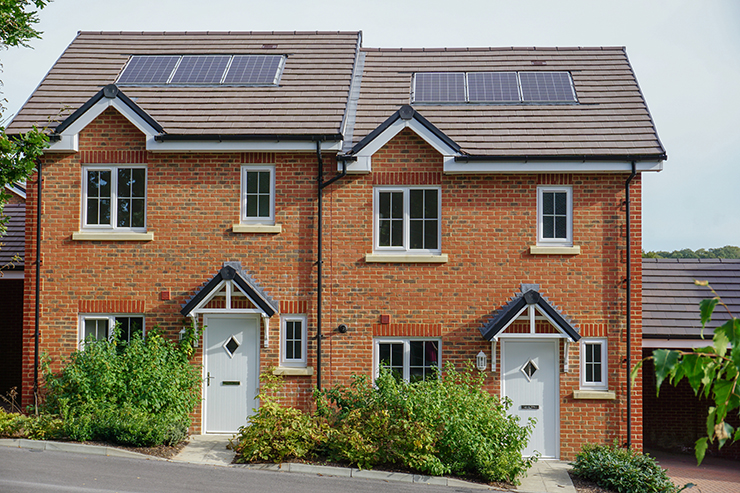How to deal with neighbour disputes

Having a good relationship with your neighbours is vital if you want to enjoy a peaceful home life. Unfortunately, this is not always possible, especially when you and your neighbours have different lifestyles and values.
From disagreements over property boundaries to arguments about noise levels, it’s really important that you address neighbour disagreements properly, as this can prevent things escalating to law courts and expensive legal fees.
This blog provides some practical tips on how you can deal with neighbour disputes, as well as general advice on maintaining positive relationships with those who live around you. Have neighbours from hell? Don’t worry – we’ve included some tips on what you can do if your neighbours refuse to collaborate.

How do you resolve a neighbourly dispute?
Have you tried talking to your neighbour?
Always try and resolve the problem with an informal chat first. We recommend you speak to your neighbour face to face, as it might be harder to convey your message over a text or note, hurting your chances of peacefully resolving the problem.
Speak politely but firmly. Avoid accusatory language that might make your neighbour defensive and instead focus on how their behaviour is affecting you. If you rarely see them, then leaving a note asking for a meeting or a phone call could be a good alternative. A phone call could also be a good option if you’re scared or worried about approaching them in person.
If an informal chat with your neighbour doesn’t work…
Have you tried using a mediation service?
There are a range of mediation services you can use if you’re failing to reach a compromise with your neighbour. A trained, impartial third party will act as a referee in your dispute, helping you resolve the problem. Dispute resolution mediators often cost a fee, but this will still be cheaper than hiring a solicitor.

If a mediation service doesn’t work…
Have you tried contacting your local council?
If mediation fails, you could also try and make a complaint to your local council. They might be able to help if your dispute is due to a statutory nuisance. These are anything involving artificial light, smells (such as steam, smoke, fumes or gases) or excessive rubbish piling up. In other words, anything that could have an impact on your health. You can also report a noisy neighbour to your council – they have a duty to investigate all statutory nuisance complaints.
If your neighbour is renting, then you could try and contact their landlord instead.
If contacting your local council doesn’t resolve the problem…
Have you considered hiring a solicitor?
A very last resort is taking your neighbours to court. This is incredibly expensive, often costing upwards of £20,000 for a dispute that you should be able to resolve without legal action. Mediation services attempt to come to a win-win for both parties, and should be your first course of action if speaking to your neighbour doesn’t solve the problem. If this fails, then you might want to consider speaking to a neighbour dispute solicitor.

How can I deal with difficult neighbours?
If you’ve tried speaking to your neighbour, have tried a mediation service, and have even contacted the local council, and still the problem persists, there are a few things you can do to improve the situation without resorting to expensive legal action.
In particular, in a scenario where you and your neighbour continue to argue over a dispute, minimising how much you see and hear them is key to ensuring a peaceful home situation.
1. Increase your garden privacy

To make your garden more secluded from neighbours and to reduce the chances of being shouted at across a fence, you could:
- Hire a gardener to plant high hedges or have a wall or fence built to raise the boundary between your properties. You can then grow climbing plants on your fences to add an additional layer of privacy
- Install privacy screens. There are several options for garden screening to choose from, including screening rolls made from bamboo or rattan and acoustic fencing options that block out noise as well
- Install security gates
- Get a pergola, awnings or parasols to shield your garden from nearby second floor windows
- Use low seating in your garden to maximise the height from your fence
Maximising the height of your side fences and walls will give you more privacy from disruptive neighbours. You can have a fence built up to two metres without the need for planning permission. If you need your boundary to be higher, a summer house or shed (which can be 2.5 metres) might be a good alternative.
To make your garden more private, speak to a skilled garden landscaper today.
2. Sound proof your home

There is nothing worse than noisy neighbours. Your home should be a peaceful haven. Somewhere you can relax in and – most importantly – a place where you can shut the outside world out.
If you have repeatedly attempted to get your neighbours to keep it down, yet still find yourself being kept awake at night when your alarm is due to go off very soon, then soundproofing your home might be a good idea.
Not only will soundproofing your home allow you to make more noise without bothering your neighbours, it will also keep noise from travelling in too. It will improve your privacy by preventing voice leaks and enhance your quality of life.
To get your walls soundproofed, speak to a specialist tradesperson today.
3. Keep track of everything

Always keep a detailed record of all incidences, from noise to mess to anti-social behaviour. Take pictures and videos where relevant and keep any letters or notes you receive. This can all serve as evidence should the problem force you into taking further action.
Be as specific as possible when you collect evidence, as this will come in handy later on should you wish to make an official complaint (or take your neighbours to court).

Neighbour disputes FAQs
Do you have to declare disputes with neighbours when selling?
You’re legally required to fill out a Property Information Form (TA6) when selling your property. This form includes questions about neighbour disputes and complaints.
Not answering these questions truthfully could lead to the buyer of your property taking legal action against you. Your buyer’s solicitor will also research any issues with your property, so it’s best to be upfront and transparent about any problems you’ve had with your neighbours.
Neighbour disputes could negatively impact your chances of selling your property. Potential buyers might be turned off by problematic neighbours. This is why it’s always best to try and resolve problems informally, by chatting to your neighbours in a non-confrontational manner.
What can you do if your neighbour threatens you?
The advice in this blog is for non-threatening behaviour. If your neighbour is harassing you or behaving violently, then contact the police. Call 999 if the crime is still happening in the UK, or 101 to report a crime later.
This includes if your neighbour is sexually harassing you, or harassing you because of your religious, ethnic or sexual background. You should also call the police if you believe your neighbour is breaking the law.
Can a neighbour dispute planning?
When you apply for planning permission, your local planning authority will let your neighbours know, inviting them to submit any objections they might have. Your neighbours can then object to your local planning authority by describing how your proposed renovation would negatively impact them. Your local authority will then review all objections and make a decision on your application.
Keep in mind that a neighbour’s objection to your plans won’t automatically mean that your application will be refused, so don’t panic if your neighbour is set against your next renovation! For more information on applying for planning, read our planning permission guide.

Can I claim if a house seller didn’t report a dispute with neighbours?
Sellers have a legal obligation to disclose disputes with neighbours when filling out the Property Information Form (TA6). Failure to do this might make them liable for any resulting losses or damages you have suffered due to the false information they provided.
You’ll need to be able to prove that the seller deliberately failed to disclose information they knew or should have know, as well as show proof that you have suffered financial loss or damage as a result. If you think this is the case for you, contact a solicitor – they will be able to advise you on what you should do next.
What can I do if my neighbour disputes a boundary?
To resolve a boundary dispute, you should:
- Look over your title deeds and check where your boundaries lie (consult a solicitor or a surveyor if you aren’t sure)
- Have a non-confrontational chat with your neighbour to come to a mutually beneficial solution
- Use a mediation service if you can’t resolve the disagreement between you
- Hire a solicitor
How do I find out about neighbour disputes when buying a house?
When it comes to tricky neighbours, always do your research before buying a property. To check whether the property you’re buying has problematic neighbours, you can:
- Ask the seller to provide information about any disputes they’re aware of (they’re legally obliged to disclose relevant information in the TA6 form)
- Ask your local council, who can provide you with information about complaints made, planning applications and other relevant information
- Hire a solicitor, who will conduct research and provide you with legal advice on the relevant disputes to do with your property
If you aren’t sure, hire a legal expert – they’re the most likely to fully inform you of the potential problems you might face with your new neighbours.

Neighbour disputes happen all the time. They shouldn’t be ruining your quality of life though! Always take a proactive approach, making sure you address issues early on and in a non-confrontational way. Mediation services and your local council should be your next reference point, with legal action being a last resort, in dire situations.
Nobody wants to live right next door to their sworn enemy! Always aim to find a win-win solution for both parties.



